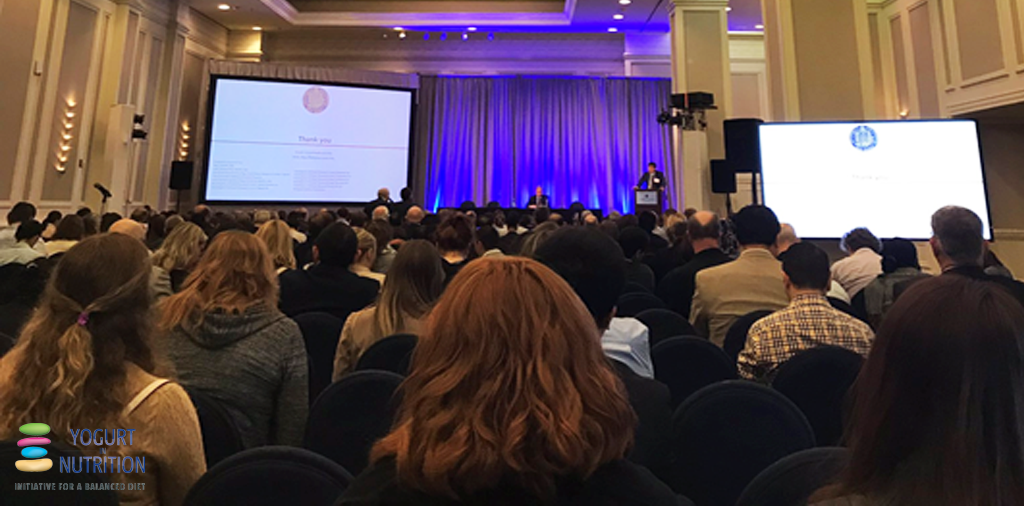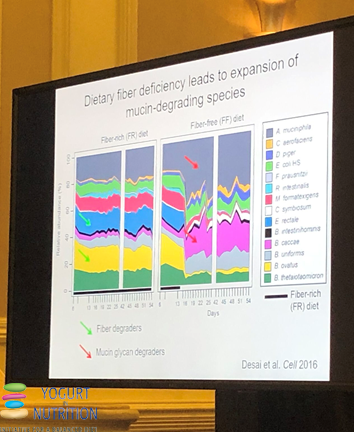For the last Gut Microbiota World Health Summit, held in March 2019 in Miami, top gut health researchers from around the globe convened to present their research, furthering our knowledge base in this area. Lori Shemek, PhD, was invited to attend the Summit and we have the pleasure to share her report and key messages of the Summit.
By Lori Shemek, PhD
In attending the last Gut Microbiota for Health Summit, there were a few pieces of research presented that had an effect upon my view, like probiotic effects on gut health.
Fiber’s Role in Gut Health
In light of the ketogenic diet, the newly discovered carnivore diet and even the Western diet, whichever type you choose, it was clear, with research presented, that a fiber rich diet is highly beneficial to the gut vs. no fiber.
Eric Martens, PhD., showed how a fiber-deprived gut leads to increased pathogen susceptibility. While a low-fiber diet may not drive inflammation in the short term, it may increase disease risk in the long term, due to changes in microbiota & mucus degrading bacteria. In fact, he asserts that low dietary fiber intake worsens colitis and inflammation.
It may be time to reevaluate our fiber recommendations.
“The more plants you consume, the more gut microbiota you have” ~Eric Martens, GMFH Summit 2019
Why is fiber so beneficial to our gut health? Our ancestor’s diets included twenty times the fiber we eat today. What you eat selects for the trillions of microorganisms that inhabit our gut and we are what they eat.
Fiber produces short chain fatty acids (SCFA) and are a powerful key to optimal health. SCFAs are produced when the friendly gut bacteria ferment fiber in your colon, and are the main source of energy for the cells lining your colon. These fatty acids may reduce the risk of inflammatory diseases, metabolic disease, type 2 diabetes, obesity, heart disease and other conditions.
Alternatively, reduced fiber intake causes gut bacteria to forage on the protective mucous lining for nutrients, leading to erosion of the gut barrier, leaving one susceptable to pathogens and promoting inflammation for those predisposed. Having said this, very low carbohydrate diets such as the ketogenic diet produce SCFAs helping to optimize health.
Also very compelling was Marten’s research showing that a healthy, high fiber diet, two to three days pre-surgery, reduces the risk of surgical complications and infection (in rats).
Dr. Martens also agrees that it is challenging or impossible to replace or change gut health with probiotics.
“Diet is the major force in shaping the gut microbiota – Dr. Liping Zhao, professor of microbiology, GMFH Summit 2019”
The Gut as a Participant in Heart Disease
Dr. Stanley Hazen, MD, PhD presented interesting research showing that our gut microbes can have an active role in human health and in promoting atherosclerosis or the collection of plaque inside the arteries leading to heart disease.
Dr. Hazen’s research showed that an inflammatory marker trimethylamine-N-oxide (TMAO) is a gut microbe generated metabolite that is responsible for increased heart disease and plays an active part.
TMAO is generated by the action of gut microbiota from our food choices. Red meat, eggs, dairy products are rich in choline, lecithin, and carnitine and markedly increases this inflammatory marker. The surprising twist is that fish is very high in TMAO and yet does not have this profound negative health effect, just the opposite.
However, not all studies have demonstrated an association between TMAO and atherosclerotic heart disease. The overall point with Dr. Hazen’s research that this gut conversion, with red meat and eggs, he reasons, leaves one vulnerable to heart disease, I find this challenging as most fish contain the highest amounts of TMAO. Fish is notorious in its ability to reduce cardiovascular disease. This is an interesting study and should be investigated further.
Finally…
Attending the GMFH World Summit was a great experience with the vast amount of research presented. Thank you to the GMFH World Summit organizers and to Yogurt In Nutrition Initiative, it was an excellent summit, quality data and presentations leading us all to better health.
Lori Shemek, @LoriShemek
Thank you to Lori Shemek, PhD for her work and feedback.




